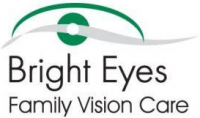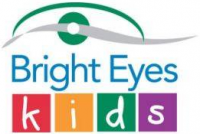Welcome to The Bright Eyes Podcast: Advice for Healthy Vision for All Ages. Your hosts are Dr. Nate Bonilla-Warford & Dr. Beth Knighton, residency-trained optometrist that provide eye exams for glasses and contacts, and specialty services including vision therapy, myopia control, orthokeratology, and sports vision training. Their mission to empower patients by providing the best in friendly, professional, and individualized eye care.
In this episode, Dr. Nate talks about importance of eye protection during the total eclipse.
Full Transcript: (Dr. Nate)
- From partial-eclipse territory in Tampa, Florida it's the Bright Eyes Podcast. My name is Dr. Nate Bonilla-Warford and I'm excited to talk about this important topic. There's lots of people that are talking about the upcoming eclipse and I think that that's great because this is a once in a lifetime opportunity for lots of people. I don't know if you remember the eclipse that occurred in 1979. I do remember getting together with people and watching it. This is the first total collapse to cut across continental path over the United States since 1918 and lots of people are going to be watching the eclipse. There's only a small band from Oregon to South Carolina where about 12,000,000 people live that they're gonna be able to see the total eclipse. I have friends that are traveling to that narrow area so that they can see it in person. But the reason why I'm doing this episode of the podcast is not so much for the astronomical interest but because of the potential for harm that can happen if you are not prepared.
- Now, last episode Dr. Beth and I talked about types of damage that can occur both short term and long term from ultraviolet light. Well when we're talking about the eclipse, when we're talking about actually looking at the sun, this is ultraviolet light damage on steroids! Now you've been told (probably your entire life) "do not look directly at the sun" and that's true at all times, but it's especially true during an eclipse when the most interesting thing going on is the sun and its relationship to the moon and the earth. Why that's such a big deal is because there is something called "solar retinopathy" or sometimes called "eclipse blindness". What happens is, if you look directly at the sun, the focused light of the sun can cause permanent damage to the back of the eye. However, the back of the eye does not have any pain sensors so you won't feel any pain or see any symptoms right away. What will happen is later on, later that day or the next day you might notice that you're having trouble seeing. Just as a quick example if you ever look at a strobe light briefly or if you look at a light bulb that doesn't have a lamp shade on it, you see what's called an after-image. And it's just a little image that you see for a little while and it's different colors and it slowly fades away. That is the where these photoreceptors of the back of the eye are over-stimulated. It takes awhile for them to get down to regular levels. This is it completely different phenomenon. This (solar retinopathy) is where there's actual damage to the back of the eye. And so while it's very exciting, and I do encourage everybody to check it out, I do want everybody to do that safely. So I have 4 items that were published by the American Optometric Association and I'm going to read them and then comment on them just a little bit.
- Number 1: use approved solar eclipse viewers. The only safe way to view a partial solar eclipse is through special purpose solar filters such as eclipse glasses or viewers that meet international standards ISO 12312-2 for safe viewing. Sunglasses, smoked glasses, unfiltered telescope or magnifiers, polarized filters are unsafe. If you can't find eclipse viewers, build a pinhole projector to watch the eclipse.
- So a couple different things here. First of all, pinhole projectors are pin hole viewers are pretty cool and you can do that anytime you don't necessarily have to do that during eclipse time. And so I would encourage anybody to check that out and I'll put a link in the show notes. But mostly people are going to use a solar eclipse viewers and and what I really want to point out about that is 1) do get them. They're very inexpensive. We've got some the for the staff, because it's happening during our business hours, and you can get the many different places I will put a link (below). But the most important thing is: I've read news articles about how there are fake solar viewers and so you should test yours out to make sure that they're safe. And the easiest way to test them out is put them on and make sure the only thing that you can see through them is essentially the sun. Anything that's less bright than the sun, like a computer monitor or a flashlight or a light in the house, you should NOT be able to see through it. If you can, then that's not safe. The other thing is they do sell filters for telescopes and it's very important that you not use the viewing glasses or the eclipse glasses to look through the telescope because the telescope has concentrated that light so brightly that that's not anywhere near a sufficient protection.
 Number 2: Technique of the pros: Before looking at the sun, cover your eyes with the eclipse viewers.. While standing still, glance at the sun and then turn away and remove your filters. Do not remove your filters while looking at the sun.
Number 2: Technique of the pros: Before looking at the sun, cover your eyes with the eclipse viewers.. While standing still, glance at the sun and then turn away and remove your filters. Do not remove your filters while looking at the sun. - So this accomplishes 2 purposes. First, of all you can't wear the solar viewing protection full time because you can't see anything. (And if anybody remembers the peril sensitive sunglasses from Hitchhiker's Guide to the Galaxy, it's kinda like that - in scary situations). So you can't just wear these all the time. But what you want to do is you want to position yourself so you're not walking around, put them on look at the eclipse look away, and then take them off. That ensures that you're protecting your eyes from the sun and you're protecting your body from walking around.
- Number 3: Totally awesome. Only within the path of totality can eclipse viewers safely be removed to view the eclipse. Once the sun begins reappearing, however, viewers must be replaced.
- And so this is true. But I still want to provide a note of caution. The eclipse is only going to be in totality for 2 minutes and 40 seconds (at longest) so during that time if you're in the path of the total eclipse. You can take off your viewers you can look at the eclipse, however I don't encourage you to do that for very long because very quickly the sun's going to reappear in you're going to be at risk again. So I would only encourage you to do that for a short amount of time and then replace your viewers as the sun becomes exposed.
- And finally: Visit your doctor of optometry if you should experience any discomfort or vision problems following the eclipse visit your doctor of optometry for a comprehensive exam.
- Now, of course we recommend that people get exams regularly anyways but this is one of those special situations. I have a few other links that I'm going to put in about the eclipse that I think are interesting: the map and some information about the solar viewers. I hope everybody enjoys it has a great time. I'm very much looking forward to it. I know my kids are. But I've mostly want everybody to stay safe. If you have any questions let us know at office@BrightEyesTampa.com. We'll see you next time!
Links:
- American Optometric Association Eclipse Information
- American Ophthalmology Academy Eclipse Information
- American Astronomical Association: Where to get safe viewers
- American Astronomical Association: How to tell if your eclipse viewers are safe
- Little Four Eyes Eclipse Info
- Hillsborough County School Eclipse Information
- How to make a pinhole camera.
[youtube]vS9DNEh8_CU[/youtube]
Thank you for listening. If you have questions, comments, or suggestions, you can email us at office@brighteyestampa.com.
The only purpose of this podcast is to educate and to inform. It is no substitute for professional care by a doctor experienced in the area you require. This podcast is provided on the understanding that it does not constitute medical or other professional advice or services. Please consult your physician for diagnosis and treatment.
Intro/outro music: Lucas Warford of Three For Silver.
Photo Credit: https://www.flickr.com/photos/107937702@N04/



Great explanation, from now on I will be able to enjoy the eclipse better thank you.